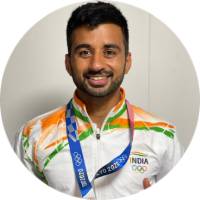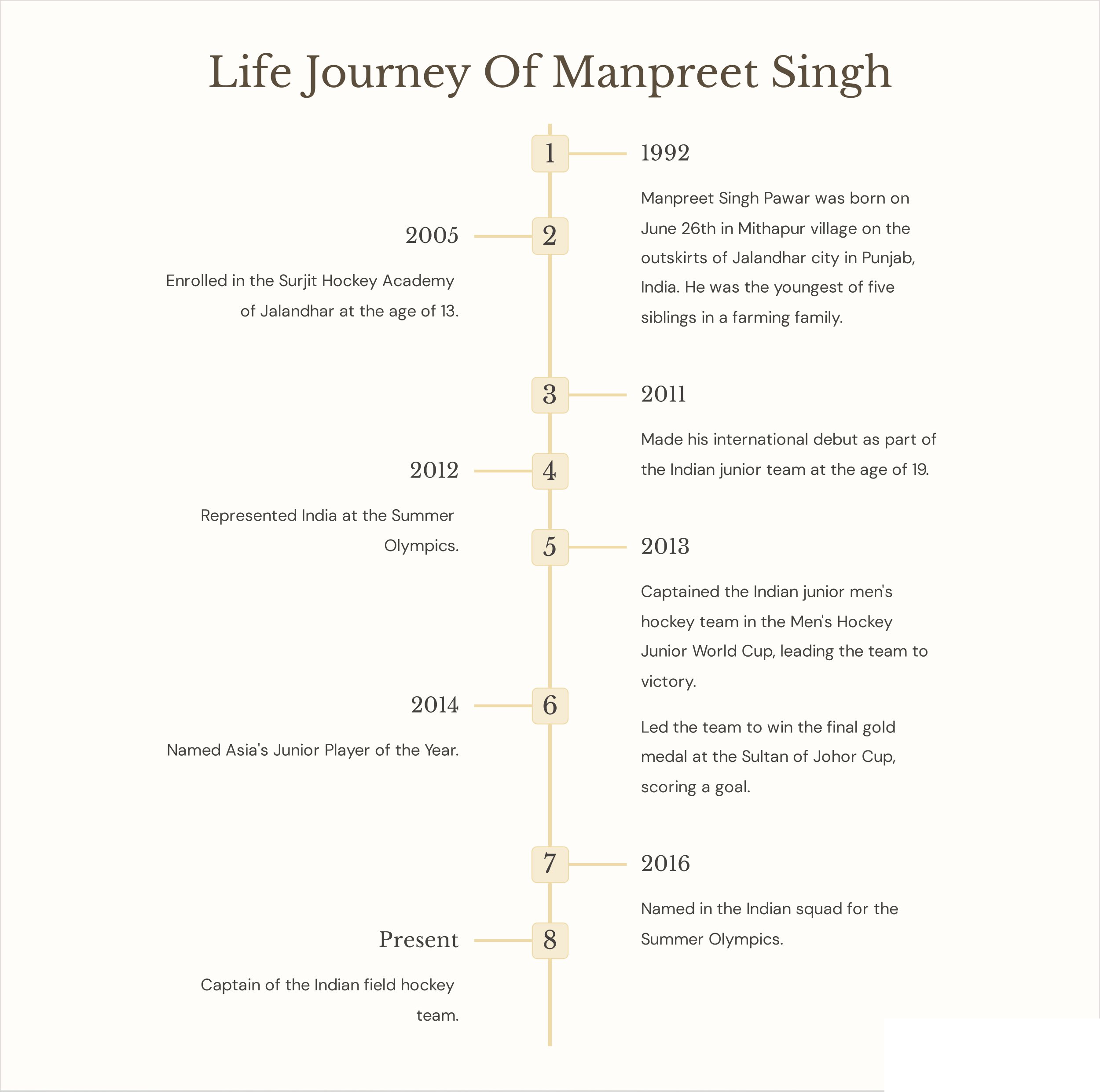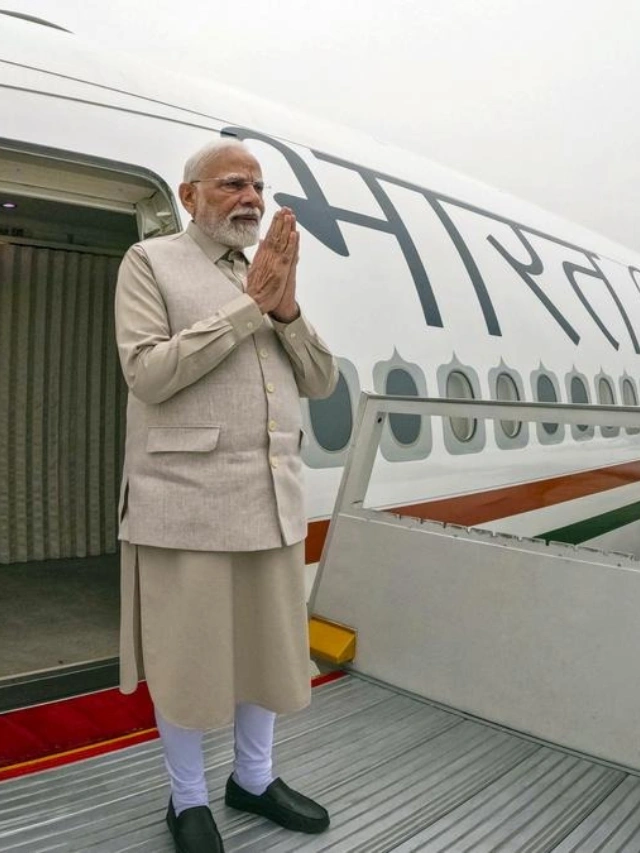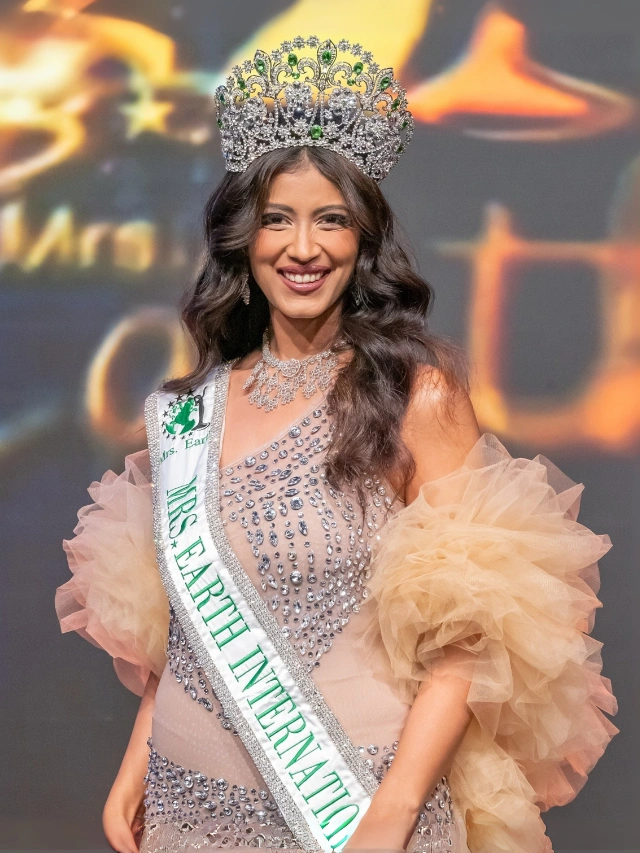Manpreet Singh
Manpreet Singh has emerged as one of the most decorated figures in Indian hockey. The remarkable athlete became the second player in Indian men’s hockey history to achieve 400 international caps. At 33, this talented midfielder from Punjab has secured his place in history books as the second-highest capped Indian men’s player. Only former Captain and current Hockey India President Dr. Dilip Tirkey, with 412 caps, ranks above him.
Manpreet Singh’s leadership guided the Indian field hockey team to a bronze medal at the Tokyo 2020 Olympics. His exceptional skills earned him the distinction of becoming the first Indian hockey player to win the FIH Best Player of the year award at the 2019 FIH Awards. The champion’s impressive trophy cabinet showcases 4 Asian Champions Trophy titles (2013, 2018, 2023, 2024), 2 Asian Games Gold medals (2014, 2023), 2 Olympic Bronze medals (2020, 2024), and 2 Commonwealth Games Silver medals (2014, 2022).
CEO’s | Actors | Politicians | Sports Stars
A young boy from Punjab started with just a stick and a dream. That same boy transformed into a central figure in Indian hockey’s revival. Manpreet’s path to success rests on determination, hard work, and a steadfast passion for the game. This piece explores deeply into this four-time Olympian’s remarkable story and chronicles his rise from humble beginnings to international stardom while highlighting the challenges he conquered.

Early Life and First Steps into Hockey
Growing up in Mithapur, Punjab
Born into humble beginnings, Manpreet Singh came into this world on June 26, 1992. His birthplace was the small village of Mithapur near Jalandhar, Punjab. His family earned their living through farming. He was the youngest of five siblings in a traditional Sikh household. Mithapur has a special connection to Indian hockey. The village has given the country several national players. One of them is the legendary Padma Shri awardee Pargat Singh, who served as the deputy police superintendent in the area.
Life in rural Punjab shaped Manpreet’s early years by a lot. Money was tight, but the area’s rich hockey culture gave young talent room to grow. Mithapur and its nearby villages have always sent players to the national team. This legacy continues even today. The village’s love for hockey and strong community spirit helped spark Manpreet’s interest in the sport.
Family influence and early passion
Hockey ran in the family blood for young Manpreet. His elder brothers, Amandeep and Sukhraj, played hockey and won many prizes in local tournaments. These wins caught 10-year-old Manpreet’s attention. His brothers’ recognition drew him to the sport. Sadly, Amandeep got a bad injury while playing. This ended his chances of moving forward in hockey.
Parental resistance stood in Manpreet’s way at first. His mother, Manjit Kaur, thought hockey was too dangerous. She wanted to keep her youngest child safe. Her fears made sense, especially after Amandeep’s injury. She once locked Manpreet in a room to stop him from playing hockey. But the determined boy escaped and kept chasing his dream.
Financial struggles made Manpreet’s early hockey days even harder. His father, Baljit Singh, had worked as a carpenter in Dubai. He had to come back due to health issues, which put more pressure on the family’s finances. Both brothers had to give up their hockey careers because they couldn’t afford to continue. In spite of that, Manpreet kept going with amazing determination.
Joining Surjit Hockey Academy
Professional guidance came from Manpreet’s first coach, Surjit Singh, who saw the boy’s talent. The coach took on the task of convincing Manpreet’s hesitant parents to let their son play hockey. He told Manpreet’s angry elder brother to “at least let him try since he was so keen to play”. This help proved vital in getting his family’s support.
A turning point came when Manpreet won his first prize of ₹500 cash in a tournament. This small but important win changed his family’s point of view. They started supporting his hockey dreams fully. The money, though not much, showed that hockey could offer more than just risks.
Formal training started in 2005 when 13-year-old Manpreet joined the prestigious Surjit Hockey Academy in Jalandhar. The 2005-old institution has become one of India’s most wanted hockey academies. Students must pass a tough selection process. This includes five-day trials and three-day physical fitness tests. Expert coaches give detailed training in technical skills, physical fitness, and game strategy.
The academy’s legacy speaks for itself. It has produced about 30 players for the Indian national team. Nine of the 19 players who won the bronze medal at the Tokyo Olympics learned their craft at this academy. This environment gave Manpreet the perfect start to his growing career, leading him toward international success.
Rise Through Junior Hockey
Captaincy in 2013 Junior World Cup
The path to leadership started early for Manpreet Singh. He became the captain of India junior men’s hockey team at the 2013 Men’s Hockey Junior World Cup. This role marked his most important milestone. The coaching staff trusted his skills as a player and leader. Manpreet showed exceptional maturity and tactical understanding at just 21 years of age. These qualities set him apart from others.
Building experience was vital to Manpreet’s growth before becoming captain. He had gained substantial international experience since his senior team debut in 2011. His exposure to high-level competition gave him valuable lessons. He shared these insights with junior teammates and bridged the gap between senior and junior squads.
Victory at Sultan of Johor Cup
Triumphant leadership defined Manpreet’s role at the 3rd Sultan of Johor Cup in 2013. He guided India to gold medal victory in Johor Bahru, Malaysia. The team showed exceptional skills under his leadership. They defeated strong teams like England, Argentina, Pakistan, and South Korea throughout the tournament. India sealed a convincing 3-0 victory against host nation Malaysia in the final match.
Personal glory came with team success. Manpreet scored a goal in the 64th minute of the final match. He converted a penalty corner to secure the victory. His performance showed his ability to lead by example during crucial moments. The tournament victory became Manpreet’s “best moment” in his junior career.
Beyond hockey, the Sultan of Johor Cup brought an unexpected personal connection. A Malaysian woman named Illi Najwa Saddique asked Manpreet for a photograph after India’s victory. This chance meeting sparked a relationship that led to marriage later.
Named Asia’s Junior Player of the Year
Recognition at continental level arrived in 2014. The Asian Hockey Federation named Manpreet Singh ‘Junior Player of the Year’ during their Congress in Kuala Lumpur, Malaysia. This prestigious award recognized his exceptional performance as player and captain. He established himself as one of Asia’s most promising hockey talents.
Impressive statistics supported this honor. Manpreet had played 103 international matches by age 22. This remarkable achievement showed his consistency and value to both junior and senior national teams. It highlighted his quick rise as an international player.
Leadership qualities stood out in Hockey India Secretary General Dr. Narinder Batra’s congratulatory message. He noted: “Apart from a skillful midfielder, he also has the leadership qualities to motivate other players to fight till the final whistle”. These traits became fundamental to his future role as senior national team captain.
Rapid progression marked this phase of Manpreet’s career. He represented India at major senior tournaments while still playing junior hockey. Before receiving the Junior Player of the Year award, he had won silver at the Commonwealth Games in Scotland. He also played for India at the FIH Men’s World Cup in the Netherlands. His smooth transition between junior and senior levels proved his exceptional skill and adaptability.
Senior Career and Major Tournaments
Debut in 2011 and 2012 Olympics
International breakthrough came for Manpreet Singh in 2011 when he joined the senior team as a 19-year-old. His talent and hard work quickly earned him a spot in the 2012 London Olympics squad. He became one of the youngest players to represent India at this prestigious tournament. India finished 12th, but the experience proved to be a great way to get insights for his growth as an international player.
Olympic reflections show Manpreet’s amazement at his first Games. “The [Olympic] village. It was the first time that I saw [famous] athletes walking around. It was like a dream come true, to be in the same space as them,” he remembered about his London experience. This early exposure to high-stakes international competition became the foundation for his future leadership role.
Asian Games and Commonwealth medals
Continental dominance marked Manpreet’s career as he helped India grab two Asian Games gold medals (2014, 2023). The 2014 win against arch-rivals Pakistan in the final stands out in his memory. India won 4-2 in shootouts after regulation time ended 1-1. “That was my first major Gold Medal with the Indian Men’s Hockey Team, and winning it as a junior player ignited the fire in my belly,” Manpreet shared.
Silver collection grew with gold medals as Manpreet lifted India’s performance in other major tournaments. The team earned Commonwealth Games silver medals in 2014 and 2022, losing to Australia in the 2014 final. The team also claimed silver at the 2016 Men’s Hockey Champions Trophy after losing to Australia 1-3 in the final. This was India’s first finals appearance in this tournament after 38 years.
Tokyo 2020 and Paris 2024 Olympic bronze
Historic breakthrough arrived at the Tokyo Olympics when Manpreet, as captain, led India to its first Olympic hockey medal in 41 years. The path wasn’t easy. After a 1-7 loss to Australia in the group stage, the team bounced back strongly. They defeated Spain, Argentina, and Japan in succession. A 3-1 win against Great Britain in the quarter-final followed before they lost to eventual champions Belgium in the semi-finals. The bronze medal match against Germany ended in an exciting 5-4 victory. Manpreet calls this his most memorable career moment.
Legacy secured at the Paris 2024 Olympics. Manpreet, now the most experienced player with 378 international caps, helped India secure back-to-back Olympic bronze medals for the first time since 1972. The team beat Spain 2-1 in the bronze medal match. “We want to dedicate this medal to Sreejesh because this was his last match,” Manpreet said after the victory. He honored legendary goalkeeper P.R. Sreejesh who retired after the tournament. This achievement puts Manpreet among Indian hockey greats. He played in four straight Olympic Games (2012, 2016, 2020, 2024) and brought home two historic bronze medals.
Personal Challenges and Comebacks
Father’s death during 2016 Azlan Shah Cup
Manpreet Singh received heartbreaking news just hours before India’s opening match against Japan at the 2016 Sultan Azlan Shah Cup. The midfielder learned about his father’s sudden death, which tested his mental strength more than any challenge he had faced on the hockey field. Head coach Roelant Oltmans gave him immediate permission to return home, believing family took precedence in such moments.
The Indian squad showed their unity by observing a minute’s silence before their Japan match and wearing black armbands to honor Manpreet’s father. This gesture reflected the team’s close bonds during their teammate’s loss. The team had to continue with 17 players instead of 18 since tournament rules prevented a replacement, which the coach called “a big blow to the team”.
Returning to play and scoring under pressure
Manpreet’s response to grief showed remarkable strength. He rejoined the team just 48 hours after learning about his father’s death, which many consider his bravest moment. His decision placed him “in a select group of Indian sportsmen who have lifted themselves above personal tragedy to represent their mental fortitude and excel on field”.
His emotional comeback peaked with a vital goal against archrivals Pakistan in the tournament. “It was the most difficult phase for me. I was broken and lost faith in everyone,” he later shared about this period. His performance amid such emotional stress showed his exceptional mental strength and commitment to team and country.
Balancing personal life and professional duties
Family became the foundation of Manpreet’s resilience through his career challenges. “My mother also encouraged me to keep playing to fulfill my father’s dream and the whole team supported me,” he shared with visible emotion. After winning the bronze medal at the Paris Olympics, he dedicated the achievement to his late father and thanked the “three angels” in his life—his mother, wife, and daughter.
Parenthood brings new challenges for Manpreet. “I have become a father, and balancing seems difficult because I miss my daughter sometimes,” he admitted. His daughter turned one and a half, and the separation during tournaments and training camps affects him deeply. Yet, this new role drives him further as his daughter inspires him to excel.
Mental strength remains vital for Manpreet. Looking back at high-stakes tournaments, he emphasized the need for psychological support: “When you go to big tournaments, you often have that mental pressure because of the grand stage, and playing in front of big crowds. So, you need to be mentally strong”. These words come from someone who has directed both personal tragedy and professional pressure at international sport’s highest levels.
Captaincy and Leadership Legacy
Becoming captain in 2017
Historic appointment changed Manpreet Singh’s career path on May 18, 2017. He took charge as India’s hockey team captain for the three Nations Invitational Tournament in Germany and the World League Semi Final in England. His leadership experience started with immediate success as India won the 2017 Men’s Hockey Asia Cup under his guidance. During his first year as captain, Manpreet guided the team to a bronze medal at the Hockey World League Final. He proved himself a natural leader.
Remarkable recognition followed in 2019. Manpreet received the prestigious FIH Player of the Year Award. He became the first Indian player to earn this honor. The team achieved a soaring win in the FIH Series Finals and secured Olympic qualification for Tokyo 2020 under his leadership. His teammates praised his unique approach that encouraged players to try new strategies and think differently.
Leading India to Olympic podium
Olympic glory marked the peak of Manpreet’s captaincy as he steered India to a historic bronze medal at the Tokyo Olympics. This victory broke a 41-year medal drought. The team bounced back from a tough 1-7 loss to Australia in the group stage. Manpreet’s leadership helped defeat Spain, Argentina, and Japan in succession. A quarter-final win against Great Britain (3-1) led to a semifinal with Belgium. The team ended up securing bronze with an exciting 5-4 victory over Germany.
Emotional triumph swept over Manpreet during the medal ceremony. “After 41 years, bringing back something that the nation had craved for will never fade from my memory. The flag-raising ceremony was emotional for me and I started crying. Many emotions flowed through me: joy, relief, satisfaction, pride and gratitude”, he shared about this defining moment.
400 caps milestone and beyond
Elite accomplishment arrived in 2025. Manpreet became the second Indian men’s hockey player to reach 400 international caps. He stands behind former captain and current Hockey India President Dr. Dilip Tirkey (412 caps). His path from his 2011 debut to becoming Indian midfield’s cornerstone reflects hockey’s evolution on the global stage.
Continuing hunger pushes Manpreet despite his achievements. “I still remember the goosebumps I felt in my debut game. To be standing here, 400 games later, is beyond anything I imagined… I’m still learning, still growing — and I play with the same hunger today as I did at 19”, he reflected after this milestone.

Also Read: Journey of Mahendra Singh Dhoni
FAQ:
Who is Manpreet Singh?
Manpreet Singh Pawar is an Indian field hockey player, widely regarded as one of India’s best midfielders. Manpreet Singh has captained the Indian men’s national team and is known for his leadership both on and off the field.
When did Manpreet Singh make his international debut?
Manpreet Singh made his senior international debut in 2011 at the age of 19.
What are Manpreet Singh’s major achievements and accolades?
Manpreet Singh captained India to a bronze medal at the Tokyo 2020 Olympics. Manpreet Singh was also the first Indian to win the FIH Player of the Year award in 2019. He has received the Arjuna Award (2018) and the Major Dhyan Chand Khel Ratna (2021).
What is Manpreet Singh’s background and early life?
Manpreet Singh was born in Mithapur village near Jalandhar, Punjab, into a farming family. Manpreet Singh developed his passion for hockey by playing with his elder brothers.
What personal hardships did Manpreet Singh face?
Manpreet Singh overcame a serious knee injury early in his career that kept him out of play for almost a year.
Is Manpreet Singh married?
Yes, Manpreet Singh is married to Illi Najwa Saddique, who is a former hockey player from Malaysia.
Does Manpreet Singh have any notable records?
Manpreet Singh has played over 400 international matches for India, making him one of the most capped Indian hockey players.
What are Manpreet Singh’s personal likes or routines?
Before matches, Manpreet Singh enjoys playing FIFA, listening to music, meditating, and practicing yoga. Manpreet Singh also loves spending time with his family and pets.




